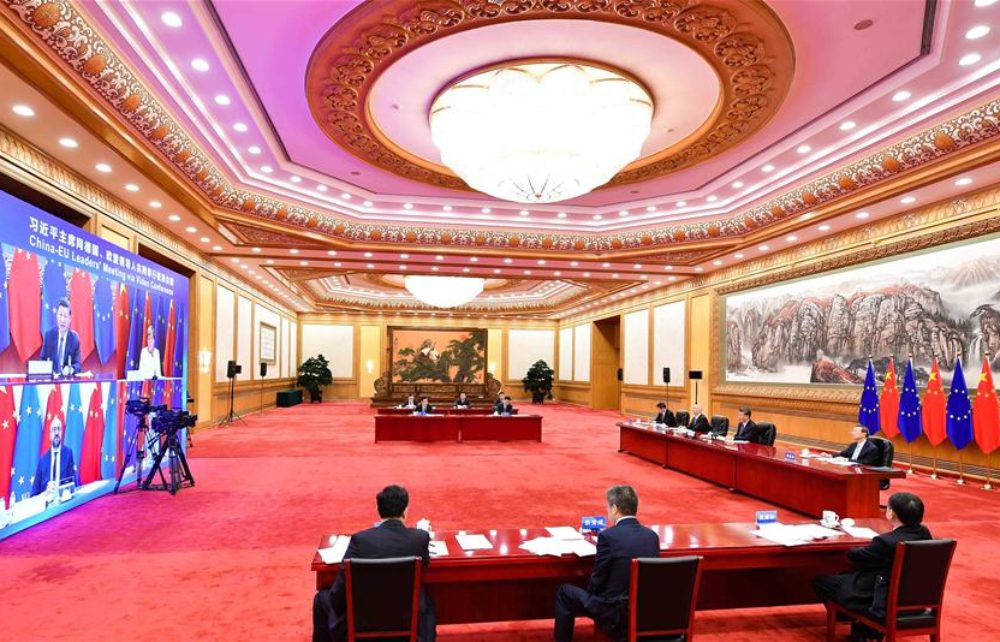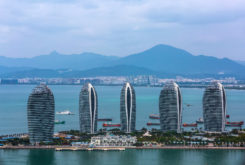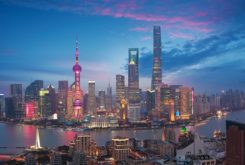The European Union is calling on “more ambition” from China to close a landmark EU-China Comprehensive Investment Agreement (CAI) until the end of the year.
The European Union and China held a Leaders’ Meeting via videoconference on 14 September, as a follow up on discussions at the 22nd EU-China Summit (22 June), with President of the European Council, Charles Michel, President of the European Commission, Ursula von der Leyen, and the Federal Chancellor of Germany, Angela Merkel, for the Council Presidency, with Chinese President Xi Jinping.
With regard to the negotiations for the EU-China Comprehensive Investment Agreement (CAI), both sides registered progress on the rules regulating the behaviour of State-owned-enterprises, on forced technology transfer and on transparency of subsidies.
But, according to the EU´s final statement, European leaders “emphasised that more work was urgently needed on the issues of rebalancing market access and on sustainable development”.
“The EU called on China to step up its ambition on these issues. The two sides reaffirmed their objective of closing the remaining gaps before the end of the year. The EU side emphasised that high-level political engagement would be required within the Chinese system to achieve a meaningful agreement”, the statement adds.
The EU also expressed readiness to continue to discuss the Strategic Agenda for Cooperation 2025, which can only be concluded once significant progress has been made in the negotiations on the Comprehensive Investment Agreement.
On other trade and economic issues, the EU reiterated its call on China to engage in future negotiations on industrial subsidies in the WTO and stressed that more needed to be done to improve market access in the agri-food trade, financial services and the digital sector.
The EU also again made clear its concerns on overcapacity, both in traditional sectors such as steel and aluminium as well as in high tech.
The two sides welcomed the signature of the EU-China Agreement on Geographical Indications which will improve access to the Chinese market especially for high-quality European agricultural products.
“The EU underlined the need for reciprocity and a level playing field in the area of science and technology, underpinned by high ethical and integrity standards. Leaders welcomed and agreed to continue the high level digital dialogue. They looked forward to concrete progress on ICT standards, product safety and research and innovation”, the statement adds.
On climate change and biodiversity, the EU encouraged China to strengthen its climate commitments in terms of peaking carbon dioxide emissions and setting the goal of climate neutrality domestically, and stressed the importance of a moratorium in China of building coal-fired power plants and financing their construction abroad, at least as part of a global initiative, while encouraging China to launch its national emission trading system soon.
The two sides agreed to establish a High-Level Environment and Climate Dialogue to pursue ambitious joint commitments on these issues and the EU “noted that joint commitments by both sides on biodiversity could be a game-changer at global level and China has a key role to play as host of the Conference of the Parties next year”.
On the COVID-19 response, the EU emphasised the shared responsibility to participate in global efforts to stop the spread of the virus, boost research on treatments and vaccines, and strengthen the role of the World Health Organisation, including through the full implementation of the World Health Assembly resolution of May 2020.
“China’s full engagement in G20 efforts to support low-income countries and effectively implement the G20 – Paris Club Debt Service Suspension Initiative will also be essential”, the EU says.
EU Leaders voiced their “grave concerns about the erosion of the fundamental rights and freedoms” in Hong Kong, following the imposition of the national security law on Hong Kong on 30 June, and also regarding “treatment of ethnic and religious minorities, the situation of human rights defenders, as well as the limitations to freedom of expression and access to information”.
“The two sides agreed that the Human Rights Dialogue will take place as a physical meeting in China later this year”, the EU adds.
On regional and international issues, the EU referred to the escalating tensions in the South China Sea, urging for self-restraint and a peaceful resolution of disputes in accordance with international law.
An EU-China Leaders’ Meeting with the participation of the Heads of State and Government of the EU member states and President Xi is foreseen to be held in 2021.
According to China´s news agency, Xinhua, President Xi Jinping proposed four principles the two sides should adhere to for developing China-EU relationship, namely peaceful coexistence, openness and cooperation, multilateralism and dialogue and consultation.
Noting China and Europe are important trade and investment partners to each other, Xi said the two sides should step up macro-policy coordination, take more measures and unleash more cooperation opportunities.
Xi said the two sides should adopt a positive and pragmatic attitude, speed up negotiations on the China-EU investment agreement to achieve the goal of completing the negotiations by the end of this year, working to upgrade cooperation, facilitate the post-epidemic world economic recovery and jointly safeguard an open trade and investment environment.
“The Chinese market remains open to the EU. More high-quality and safe EU agricultural products are welcome to enter China,” Xi said.
Xi said the two sides should properly address each other’s legitimate concerns, adding that China follows closely the recent developments of the EU in 5G, foreign investment review, government procurement and competition policy and expressed the hope that the EU will keep its trade and investment market open, foster an open, fair, just and non-discriminatory business environment and protect the legitimate rights and interests of Chinese companies.
Xi urged actively carrying out tripartite cooperation with Africa on the basis of full respect for African countries’ will, calling on the international community, especially multilateral financial institutions and commercial creditors, to take stronger actions on debt relief in Africa.
Xi also clarified China’s principled position on Hong Kong-related and Xinjiang-related issues, saying that the essence of the issues is to safeguard China’s national sovereignty, security and unity, and to protect the rights of people of all ethnic groups to live and work in peace.
Chinese people will not accept “an instructor” on human rights and oppose “double standards”. China is willing to strengthen exchanges with the European side based on the principle of mutual respect so that the two sides can both make progress, said Xi.
China and the European Union are close to an investment deal, that could be reached by the end of the year, Chinese Foreign Minister Wang Yi said last month in Paris.




